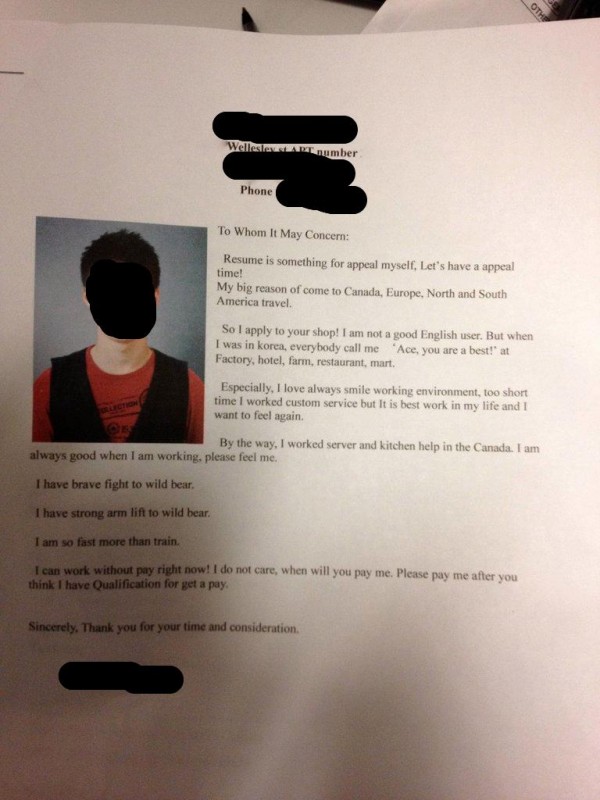Cover letters provide the opportunity to elaborate on job skills and past employment experiences listed on your resume, show off your writing ability (something important to nearly all employers), and make yourself stand out among other applicants vying for the same position.
Here are seven tips to write a kick-ass cover letter, and beat the unemployment blues:
Cover Letter Tip 1
Each time you submit a cover letter to an employer, revise the letter to make it specific to the position and company. Highlight job skills, traits and past work experience most relevant to the position at hand.
This means going beyond inserting the name of the company and a few detailed sentences into a previously written letter.
Employers recognize when job applicants have sent a stock cover letter, and when they’ve written a unique one (especially when you forget to change the name of the company, telling Company A how interested you are in the available position at Company B).
Avoid this recipe for how not to get an interview. Draft a custom cover letter for each position for which you apply.
Cover Letter Tip 2
Follow the format of a business letter. This means including contact information at the top (name, address, phone number, email), followed by the date, a formal greeting, well-organized body paragraphs, and a formal closing.
The text should be left-justified and double-spaced between paragraphs. Keep the length to one page.
Proofread the letter. Have someone else proofread for you. Edit, revise and repeat as necessary. Don’t ruin your first impression with a stupid mistake.
Cover Letter Tip 3
Try your best to address the cover letter to an actual person, rather than “Dear Hiring Manager” or “To Whom It May Concern.” Addressing the letter to a specific person makes it more personal, and more likely to be read than placed in a pile in the HR office (or worse, stashed in a computer file, and out of physical sight).
You may be able to find out the name of the person who will be reading your cover letter by checking the job posting, asking the person who told you about the position or contacting the company’s HR department.
Cover Letter Tip 4
To begin the body of your cover letter, the first paragraph should detail what position you are applying for and how you learned of the opportunity.
Briefly explain how your skills and background make you a qualified candidate for the position. Express your enthusiasm for the company and why you are interested in the position.
Cover Letter Tip 5
In the opening paragraph, don’t be afraid to mention someone you know at the company who may be able to act as a personal or professional reference, especially if you learned of the job opportunity through this person.
Be sure to ask your contact if it’s all right to drop his or her name in the letter, and if so, keep the explanation of your relationship concise (i.e. I learned of the opportunity through a former colleague John Doe, the current vice-president of communications). This will allow your reader to contact the person for a reference if desired.
It always helps to know someone on the inside, and a good referral (with a solid resume and cover letter) often leads to an interview.
Cover Letter Tip 6
In the second paragraph, explain how you meet the required skills and qualifications of the position. Utilize the job description and company profile provided in the posting or by the person who informed you of the opportunity. Elaborate on points in your resume, but don’t be repetitive.
Some companies use software that searches for specific keywords within your cover letter (and resume) to discover the applicants with the most desired skills — and weed out those without them.
Reading the job posting carefully will allow you to pick and choose keywords and phrases used by the company, which will garner your cover letter more hits and improve the chances that a human being will read your letter, and not just a computer system.
Cover Letter Tip 7
Conclude the letter with a thank you and express your interest in hearing from the reader soon regarding the status of your application. Communicate the best way to reach you, by phone or email.
If mailing the cover letter, sign and type your full name. If emailing, the likely method, you may send the cover letter in the body of the email or in an attachment. Use simple text and remove the formatting when sending the letter in the email’s body.
Always review the job posting carefully for directions on the preferred method of submitting your application materials. In the email’s subject line, include your full name and the position for which you are applying.
Last Thoughts
Now that you’ve written and revised your cover letter, and just clicked “Send,” give the employer at least two weeks to reply. Companies often receive dozens, even hundreds, of cover letters for one position and may not respond for weeks, months or at all.
If a good amount of time passes, and the employer hasn’t responded to one or more follow up emails, it’s likely that the company is not interested. Just don’t get down on yourself.
There is a multitude of reasons why the employer may not have contacted you (a subpar cover letter may or may not be a factor). Try to improve your cover letter, and sell yourself better next time.
On the other hand, if you follow these tips, you may end up getting a call for an interview and find out your cover letter was pretty kick-ass after all.
Also, check out our in-depth guide with many cover letter examples.
Also, enjoy this funny cover letter from Reddit. 50/50 on whether it’s real, but who cares.

